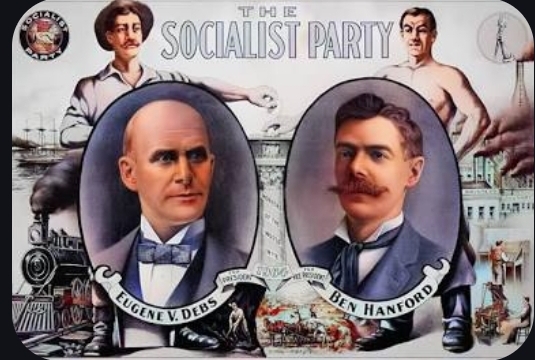Socialism and communism advocate for big government control over the economy and society, often at the expense of individual liberty. The shift of the Democratic Party toward socialist policies can be traced back to the 1932 election, when Franklin D. Roosevelt’s New Deal adopted many policies that were similar to those proposed by the Socialist Party.
The Socialist Party’s Decline and the Rise of the New Deal
The Socialist Party of America, led by figures like Eugene V. Debs and Norman Thomas, had been pushing for government intervention in industry, wealth redistribution, and expanded welfare programs. However, after Roosevelt’s New Deal policies—which included Social Security, minimum wage laws, public works projects, and increased federal control—many of the party’s goals were co-opted by the Democrats. As a result, the Socialist Party stopped running a presidential candidate after 1932, realizing that FDR was implementing much of their platform under a different name.
The Democrats Absorbing Socialist Policies
With the New Deal, the Democratic Party moved away from its original classical liberalism (limited government, individual rights) and embraced progressivism. This shift meant:
- Increased government intervention in the economy (banking regulations, public works projects).
- A growing welfare state, setting the foundation for Social Security, Medicare, and Medicaid.
- The acceptance of Keynesian economics, which justified deficit spending and government control of markets.
The Quiet Rebranding of Socialism
By the mid-20th century, Democrats avoided using the “socialist” label, but they continued advancing socialist policies under terms like progressivism, social justice, and economic fairness. Instead of outright government ownership of industries (as in traditional socialism), they pushed for heavy regulation, wealth redistribution, and government dependency programs.
Modern Parallels: The Shift Toward Democratic Socialism
Today, figures like Bernie Sanders and Alexandria Ocasio-Cortez openly identify as democratic socialists, pushing for:
- Universal healthcare (Medicare for All)
- Guaranteed basic income or expanded welfare programs
- Green New Deal-type economic controls
- Higher taxation and wealth redistribution
While many Democrats reject the socialist label, their policies still align with government-controlled economics, similar to what Norman Thomas and other socialists championed decades ago.
Conclusion
The Socialist Party stopped running candidates in 1932 because Democrats had effectively adopted their platform. Since then, the Democratic Party has increasingly embraced big government policies that mirror socialism, even if they do not openly call themselves socialists. Today’s progressives continue this trend, advancing socialist ideas under different names while rejecting the label to avoid historical baggage.







